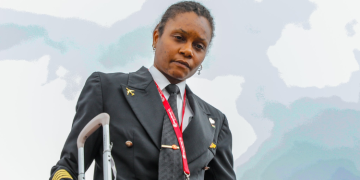In the last three weeks, three incidents have caught my attention. The first was about the Agoro Sare Teachers’ dance. On August 3, 2025, a viral video from Agoro Sare High School’s Cultural Day in Homa Bay showed six teachers, paired male and female, dancing suggestively on a raised podium before students.
Two pairs of teachers gyrated their waists suggestively toward each other while a Luo secular song played. Some students imitated the dance and joined in.
Their moves, deemed “not so modest,” sparked outrage. Community leaders urged the Teachers Service Commission (TSC) to act, and reports emerged that the teachers were asked to draft show-cause letters.
Under the TSC Code of Conduct, teachers must maintain professionalism. Yet there is no statute specifying how teachers may or may not dance.
Okanga vs. Akothee
The second case involved Nuru Okanga, once a fierce Ruto critic but now a supporter.
On August 13, 2025, he attacked musician Esther Akoth, known as Akothee, after she appeared at the Devolution Conference in Homa Bay dressed in a short thigh-length jacket (with barely visible shorts) and danced alongside singer Prince Indah.
In a viral video, Okanga hurled insults and unprintable names. Akothee brushed it off at first, but days later, Okanga was whisked to court.
Also Read: Nuru Okanga’s Warning to Raila: Ditch Ruto or Betray Kenyans
For what crime exactly? Defamation under Penal Code Section 194, or hate speech under Article 33(2) of the Constitution? But if every insult hurled at a celebrity online were prosecuted, our courts would collapse.
Later reports clarified that he wasn’t arrested simply for insulting Akothee. He had long been facing charges under the Computer Misuse and Cybercrimes Act (CMCA) from June 2024 and was out on bond.
The timing of his re-arrest, however, raised eyebrows. Why him, and why then?
Nakuru Nightclub Uniforms
The third case came on August 16, 2025.
A viral video showed five women outside Nakuru nightclub Space Next Door, dressed in “schoolgirl” outfits, sweaters, blouses, and short checked skirts, dancing to Wakadinali’s Kum Baba. It was a promotional theme night.
Public outrage followed, especially from women, condemning the club. County officials said they were probing it. But what law had been broken?
Only security uniforms, police, KDF, prisons, KWS, KFS, and Coast Guard are protected under the National Flag, Emblems and Names Act (Cap 99). School uniforms are not.
Each school designs its own; no statute prescribes national colors or fabrics. “Schoolgirl” costumes, while provocative, are not illegal.
Unless the women had stripped to nudity (Penal Code Section 181 on indecent shows) or violated the Alcoholic Drinks Control Act (2010), there was no criminal offence. So, what exactly would the charge sheet say?
The Double Standards
All three incidents stirred storms. But look closely, and a pattern emerges.
When it came to Akothee, many rallied in her defense. Her body, her dress, her choice. Article 33 of the Constitution protects freedom of expression, including artistic and personal creativity. She herself has said she does not want to be anyone’s role model. Fair enough.
But does that free her of responsibility and influence as a public figure, mother, and grandmother?
Contrast that with the Nakuru hostesses. While Akothee was celebrated for her freedom of dress, these women were condemned.
Was the outrage about their clothes or about what those uniforms symbolized? And since school uniforms are not protected by law, why invoke police power at all?
And then the teachers. No arrests, but show-cause letters. If it had been club hosts instead of educators dancing on stage, would the treatment have been the same? Under the law, teachers breached their professional code, not the criminal code.
Also Read: Uproar as Farouk Kibet Orders Millie Odhiambo to Dance on Stage
The double standards glare. Why was Okanga arrested while Akothee was untouched? Why did Nakuru women get condemned, yet Akothee got applause? Why are teachers issued disciplinary queries, while politicians and celebrities wiggle out untouched?
Selective Policing
Suppose the Nakuru hostesses had been dragged to court, what would the charge sheet say? Public nuisance under Penal Code Section 182? Some fabricated offence?
In truth, police action in pubs and bars is largely governed by the Alcoholic Drinks Control Act (2010) and NACADA regulations. If there is no narcotics offence, it should fall under the Criminal Procedure Code
But in practice, police treat bars and liquor stalls as collection points. If you’re not compliant, they press fictitious charges or threaten licence suspension. Selective harassment, plain and simple.
Morality and Power
Meanwhile, this same Kenya preaches morality from shifting pulpits.
On October 24, 2018, then–Deputy President Ruto dismissed anthropology, philosophy, sociology, history, and geography as irrelevant courses. By 2025, as President, he planted a church inside the State House.
Morality is not that simple. If Akothee’s dressing is not corrupting schoolgirls, why accuse the Nakuru women of corrupting youth or sexualizing young girls?
If teachers can dance suggestively before minors, why condemn entertainers performing before consenting adults?
What is appropriate, and what is not? More importantly, why does the law fall hard on one, soft on another, and entirely miss others?
Is the nightclub’s “schoolgirl” theme evidence of paedophilia, or just lazy cultural symbolism? And if so, doesn’t Akothee’s erotic dancing in shorts and a coat do the same?
MPs and the Dance Floor
In recent months, President Ruto’s aide, Farouk Kibet, asked nominated MP Sabina Chege to dance at a women’s empowerment event. When accused of sexualizing women, Sabina said she wasn’t complaining. A week later, Kibet asked Suba North MP Millie Odhiambo to dance.
Public outrage followed, accusing him of objectifying women. But Millie shrugged it off, saying she would dance wherever she liked. Again, Article 33 protects her freedom of expression. No law was invoked.
So again, why are teachers queried, Nakuru women condemned, Okanga arrested, while Akothee and MPs walk free?
If morality is to be policed, let it be guided by law, not proximity to power. Otherwise, we raise children in a country where the law bends to celebrity, politics, and police convenience. And that lesson is far more indecent than any dance or uniform.
Follow our WhatsApp Channel and X Account for real-time news updates.












































































